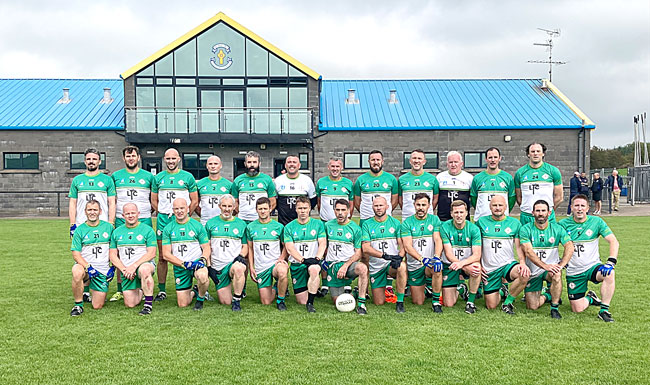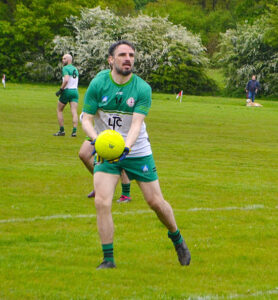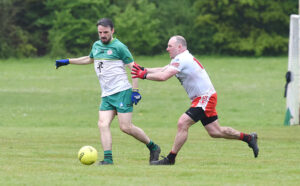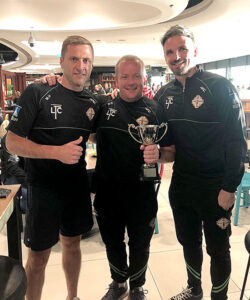Former ROI, Brentford and Leeds midfielder Jonathan Douglas on his new lease of life with the London’s Gaelic Masters football team

Wembley, Millennium Stadium, Lansdowne Road, Jonathan Douglas played at them all during a 20-year career as a professional footballer. Capped nine times by the Republic of Ireland, the midfielder can also list Brentford, Leeds United and Blackburn Rovers among his former clubs. But ask him which was his favourite ground to play at, and the answer comes without hesitation. Croke Park.

GAA flows through Douglas’ veins, you see. Growing up in Clones, Co Monaghan, he dreamt of winning Ulster titles and All-Irelands. “I’m an Irish kid and playing in Croke Park was number one,” Douglas tells the Irish World.
“Playing in an Ulster final in St Tiernach’s Park would probably have been even better for a Clones lad.” It was with Ireland, though, and not Monaghan or Clones that he achieved his Croker ambition.
It came when he started Ireland’s 1-0 European Championship qualifier win over Wales in March 2007, while Lansdowne Road was undergoing its transformation into what is now the Aviva Stadium. He’d get another run out at the home of the GAA off the bench against Cyprus a few months later.

Douglas can also claim to have played in the final international football match to be staged at Lansdowne – a 5-0 win against San Marino in November 2006 – before the bulldozers moved in. “From Clones, you’d always want to play in Croke Park for Monaghan, but to get to play there for Ireland in front of a full house was special,” says the 41-year-old. “That’s probably the biggest achievement in my career.”
Knowing that, it then makes perfect sense that after a long and distinguished soccer career, Douglas is now enjoying a belated second chance as a Gaelic footballer with the London Gaelic Masters Over 40s football team.
Last year, he was part of the Exiles side which tasted fourth-tier Challenge Trophy success, beating Leitrim-Longford in the final, and this year he’s back for more.
He’s featured in all but one of London’s four games so far, which includes wins over Sligo and Waterford. Their only defeat came at the hands of three-in-a-row All-Ireland title chasing Tyrone. “I’ve really enjoyed it – it’s been brilliant. They’re a great bunch of lads,” says Douglas.
“It was great to win something at the end of it (last year) – we’d worked really hard. We have great numbers at training and commitment.”
It was a chance conversation while attending a Brentford FC home game that led to Douglas’ involvement with the Masters.

Former Farney star Dessie Mone – a PE teacher at Douglas’ daughter’s school in Clones – had asked him about getting tickets to a Bees match for him and his brother, Connor Mone. Connor was already involved with the London Masters team, and it was he who planted the seed in Douglas.
From there it “just took off” says Douglas, who joined up with the team during pre-season last year, and ended up playing the entire campaign. “I’ve always been into my Gaelic – I loved it when I lived back home. For me, it was Saturday soccer, and Sunday Gaelic,” he said.
Good enough to represent Monaghan at Under 16 level, he recalls playing in an Ulster Championship match at Celtic Park against Derry, just before departing for England to pursue his soccer career.
The game was a curtain raiser to the senior game between Derry and Monaghan. “Even though we were well-beaten, getting picked for your county was great,” he recalls. “I knew that was probably my last game of Gaelic for a while. It’s something I look back on fondly.”
“I’ve always been into my Gaelic – I loved it when I lived back home. For me, it was Saturday soccer, and Sunday Gaelic.”
Douglas lined out at corner forward but went back into midfield to try and curtail the influence of future Derry legend Paddy Bradley, now part of Donegal’s management team. “We couldn’t get a grip on him,” Douglas reflects.
There weren’t to be more days like that, though. Douglas’ performances for Monaghan United FC had brought him to the attention of scouts across the water.
“I had to make a choice. Was I going to make a living out of Gaelic? Probably not, so I thought I’d give the soccer a chance,” he says. “I don’t regret the decision I made – it was a great decision. But Gaelic has always been my favourite sport.”
Home may be Brentford in West London, but Clones is still very much where his heart is, and he’s fully aware of his hometown club’s junior championship winning exploits last year against Killanny.
“Clones is only about 3,500 to 4,000 people and there’s a great buzz around the town. I don’t think any other sport does that, only Gaelic,” he adds.
Every summer, at the end of the soccer season, Douglas would immerse himself back into the GAA club to keep fit, before returning to England for pre-season training. And GAA playing passions reignited by the Masters, he’s now signed up this year to tog out in the reserves for London club St Brendan’s.
Impressed
Leaving Clones as a 16-year-old with no expectations, Douglas had initially hoped to sign for Celtic, with whom he had a trial. But when no offer materialised, he joined Premier League Blackburn Rovers against whom he’d impressed during a friendly with Celtic. “I wasn’t expecting anything; to play in the Premier League or represent your country,” he says.
Loan spells with Chesterfield and Blackpool followed, and it was during his stint at Bloomfield Road in 2003/04 that he answered the call from then Blackburn manager Graeme Souness. With Rovers under threat of relegation, Douglas was recalled from Steve McMahon’s Blackpool and subsequently played a significant role in helping Blackburn avoid the drop.
“We used to call ourselves ‘little old Brentford’. Nobody ever backed us, but we knew we were a good side.”
But when Mark Hughes took over from Souness, Douglas found himself out on loan again, this time at Leeds United. In all, he made 16 Premier League appearances during his time at Blackburn, scoring once in a 4-3 win over Fulham at Loftus Road, when Craven Cottage was being renovated.
Growing up a Liverpool fan, one of his stand-out wins for Rovers came against Manchester United at Ewood Park. “It (the Premier League) was a great experience, and I was hoping for more. But it wasn’t to be,” he says.
And so would begin Douglas’ painful dalliance with the play-offs.
In his first season at Elland Road (2005/06) he helped Leeds reach the Championship play-off final at Cardiff’s Millennium Stadium, only to lose 3-0 to Watford. It was a Leeds side which included the likes of Liam Miller, Gary Kelly and David Healy.
Douglas’ move was made permanent for the 2006/07 campaign only for Leeds to suffer relegation to League One. Their fate was effectively sealed on 1 May when they were hit with a ten-point penalty for entering administration.
Despite being docked a further 15 points, Leeds still managed to reach the 2007/08 League One play-off final. This time the new Wembley was the setting, but the outcome was the same as Leeds lost 1-0. But for the 15-point penalty, Leeds would have gone up automatically. Slim consolation.
The following season saw more play-off heartache as Leeds lost in the semi-finals to Millwall. It brought the curtain down on Douglas’ time at Elland Road and he moved on to League One rivals Swindon Town.
The move brought no change in his play-off fortunes, though, as Swindon lost 1-0 to Millwall in the final at Wembley. Douglas would end the campaign, though, as both the club and players’ player of the season. To add insult to injury, Leeds were promoted automatically that year.
Swindon suffered relegation to League Two the following season (2011/12), but Douglas would remain in League One with Uwe Rösler’s Brentford. The Bees had won promotion from League Two in 2009/10.
Journey
Now a Premier League force, Douglas can lay claim to having helped Brentford take its first steps on its incredible journey. He’d have to endure more play-off disappointment first, though.
Having finished the 2011/12 season in ninth place, Brentford’s hopes of automatic promotion out of League One in 2012/13 went to the final weekend of the season. Needing to beat Doncaster to go up, Brentford missed a late penalty and Doncaster went straight down field to score the winner. While Doncaster went up, Brentford went onto lose 2-1 to Yeovil in the play-off final.
“I hate the play-offs!,” he laughs. Little wonder. “It was tough to take, but in hindsight, maybe it wasn’t a bad thing. Would we have been ready to go up that year?”
The following season (2013/14), playing arguably the best football of his career, Douglas negated the play-offs by helping the Bees win automatic promotion to the Championship under Mark Warburton. “Getting promoted with Brentford was great. With Leeds you were almost expected to get promoted, but you weren’t expected to get promoted with a team like Brentford,” he said. “We used to call ourselves ‘little old Brentford’. Nobody ever backed us, but we knew we were a good side.”
Brentford finished the 2014/15 Championship season in fifth place only to lose out to Middlesbrough in the play-off semi-finals. “We were unbelievable – we played some incredible football,” he says.
Douglas had been ever-present, but his part in Brentford’s story would end there. Although he would have liked to have stayed longer at the club, his future lay down a different path. It comes as “no surprise” to him, though, to see the heights his former club has since risen to.
“You could see something was stirring from the first time I met Uwe Rösler and Mark Warburton,” says Douglas, who describes Brentford owner Matthew Benham as “a bit of a genius”. “They were talking about the new stadium back then and where they wanted the club to go.
“He’s a Brentford fan (Benham) and he had a dream. He put the money in and got the right people involved and he’s proved that dreams do come true.”
Brentford’s success for Douglas is testament therefore to how well they’re run off the pitch. He can’t say the same of Leeds, however. “Leeds have gone through three managers. Their director of football left. Even when I was there, we had four managers in four years,” he said. “But it’s hard to see them going down, because I’ve still got a few mates at Leeds that I actually played with at Brentford. “It’s not something you want to see your mates going through.”
Opportunity
After leaving Brentford, Douglas joined fellow Championship side Ipswich, where the manager was Mick McCarthy.

With hindsight, he says it was a decision he “maybe rushed into”. “Although it probably seems good at the time, sometimes you’ve got to take a little bit of time and think things through. I didn’t do that,” he said.
“I wanted to sign because I’d had a good four years at Brentford and was playing really well and enjoying my football, and the opportunity to work under an ex-Ireland manager was something I really wanted to do.
“Unfortunately, it didn’t work out.”
“It’s trying to not only be an agent, but a friend. Someone they can pick up the phone to and talk to, and at least I can relate to them.”
After leaving Portman Road in 2017, he had trials with a few clubs but then after going home for Christmas for the first time in 20 years, Douglas decided he’d “had enough”. He continued to play non-league for Richmond & Kew for a couple of years, but his time as a professional footballer was over.
He’s still very much involved in soccer, though, as an agent.
It’s a new career path he fell into somewhat reluctantly and by accident, having initially gone down the road of getting his coaching badges. Approached out of the blue by two young players he’d previously played with, whose agents “weren’t doing anything for them”, he made a few phone calls to help them out.
“I really got a taste for helping out young lads, who were no longer ‘the next big thing’,” he said. “Agents want the next big thing. Then two or three years down the line when it’s not worked out the way the agents want, they get tossed to one side.”
Douglas set up his own company and then 18 months later was approached to go and work for an agency called Gen-Z Group. His “niche” is helping young players from Ireland to make the move over to England. He’s currently got a few League of Ireland players on his books who he’ll try and bring over “in the next year or two”. He’s also got some young female players as well.
“I’ve been there and done it and can tell the parents it’s not going to be all plain sailing. It’s going to be difficult,” says Douglas, who last summer completed a Masters in Sport and Directorship.
One of the modules was on football academies, and without hesitation he rattles off that the percentage of players who enter an Academy at Under 13s and go on to make it as a professional footballer is just 0.01 per cent. “You try and tell the parents that and the young lads, and unfortunately some of them don’t want to hear it,” he adds.
“They might be the best at their club, but these teams in the Premier League have the choice of the world, so it’s trying to dampen down expectations without stopping them from following their dreams. “It’s trying to not only be an agent, but a friend. Someone they can pick up the phone to and talk to, and at least I can relate to them. “You’re there to support them and guide them along the way.”

And having been there, seen it and done it, Douglas is well-placed to do just that. He knows the pitfalls, and the highs and lows. It’s a tough industry, which is perhaps why he’s so appreciative of the success he enjoyed in the game. “I was very lucky; I achieved more than I thought I would, as a 12 or 14-year-old kid with dreams of either playing Gaelic of soccer,” he says.
“To be able to say I played in the Premier League, scored in the Premier League, played at Croke Park for Ireland in front of 80,000, and at Wembley and Cardiff.
“But I’m now enjoying this new chapter in my life with the London Masters Over 40s and going training every Monday night, playing games and travelling back and forth to Ireland. “I’m very lucky, and very grateful.”



